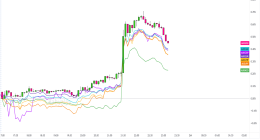CHANCELLOR Rishi Sunak is considering a freeze on personal income tax allowances, according to reports.
If he pushes ahead with the rumoured changes, we explain how it’ll affect you depending on how much you earn.
The personal allowance is the amount you can earn without paying any tax.
In the current tax year running from 6 April 2020 to 5 April 2021, that amount is £12,500, but it typically rises with inflation each year.
From April 2021, it’s currently set to rise based on the Consumer Prices Index (CPI) inflation for September, which came in at 0.5%, to £12,570.
However, according to new reports, which haven’t been confirmed by The Treasury, the planned increases would be axed and the thresholds frozen.
What is the personal allowance?
THE personal allowance is an amount you can earn each year tax-free.
In the current tax year running from 6 April 2020 to 5 April 2021, that amount is £12,500.
You then pay between 20%-45% income tax depending on how much you earn.
- Low earners: If you earn £12,500 or less, you pay no income tax
- Basic rate: If you earn £12,501 to £50,000, you pay 20% tax
- Higher rate: If you earn £50,001 to £150,000, you pay 20% tax on your earnings up to 50,000 and then 40% on anything above this
- Additional rate: If you earn £150,000 or more, you pay 45% tax
Just keep in mind your personal allowance might be different if you’re entitled to certain allowances or earn a lot of money.
The marriage allowance is a tax break where one partner in a married couple can transfer some of their unused personal allowance to another.
And people with sight issues can get the blind person’s allowance which increases this tax-free amount.
And anyone who earns over £125,000 doesn’t get any tax-free personal allowance – they will pay income tax on everything they earn.
It means taxpayers would have to pay more in tax as the plans would cancel planned tax relief.
If true, the changes could be announced in the Budget on March 3, which is likely to focus on the economic fallout from the coronavirus crisis.
How would a freeze on personal allowances affect you?
Naturally, how much more tax you’ll have to pay depends on how much you earn.
If you earn below £12,500, you already don’t pay any tax and this wouldn’t change.
If you earn more than this, the calculations by the Low Incomes Tax Reform Group show how a freeze would affect you depending on your income.
It’s not clear whether a potential freeze would be in place for just one year or several years, so we’ve outlined several scenarios.
For example, a household with one adult on the basic tax rate and one adult paying the higher rate would lose £82 in tax savings if the freeze was put in place for just one year.
However, if it remained until 2024/25, the same figure would rise to £820 over the period due to compounding.
Meanwhile, a single person earning £30,000 a year would lose £14 in tax savings in the first year, but this would rise to £140 over the same period.
The calculations assume that the CPI inflation rate remains the same at 0.5% each year.
They also take into account the usual government policy of rounding up the personal allowance to the nearest £10 and the higher-rate threshold to the nearest £100.
Should the freeze not happen, the personal tax allowance should instead reach £12,780 in 2024/25 and the higher rate would hit £51,080 if inflation remained at 0.5%, according to Low Incomes Tax Reform Group.
John Cullinane, of the Chartered Institute of Taxation, told The Sun: “This would be a very broad-based tax change, taking fairly small amounts from around 32million people.
“However the overall amount it would raise – probably no more than £1billion a year – is still pretty small set against the expected budget deficit of around £400billion this financial year and perhaps something like £100 billion going forward.
“If it happens this would be a down-payment from the government rather than a serious game-changer in tackling the deficit.
“But of course if the government kept income tax thresholds frozen for a number of years the savings – and the costs to taxpayers – would soon start to mount up.”
Meanwhile, Jo How, director of tax and advisory firm Blick Rothenberg, told The Sun: “It’s understandably the government has to raise taxes in some way.
“But it’ll be disappointing if they don’t increase the personal allowance, as that’s where some of the lowest paid workers benefit the most.”
It’s important to check your tax code is correct as it could save you money.
Meanwhile, taxes could rise to help cover the cost of the pandemic.
Last month, Mr Sunak warned of tax rises after UK borrowing hit a record £34.1billion last month.
















